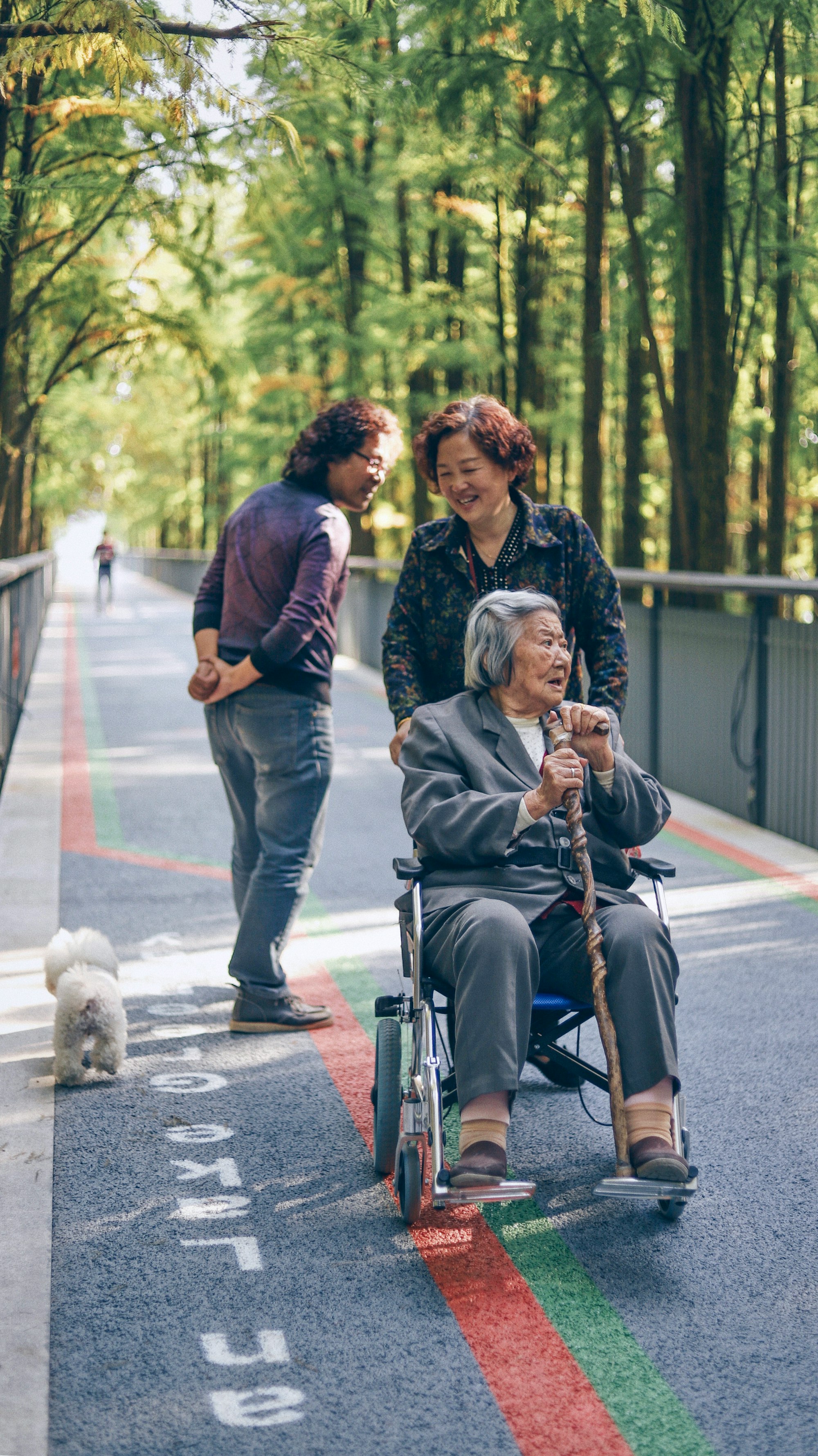Baby Boomers as Caregivers of Today
As baby boomers become caregivers for aging parents, they face unique challenges. Learn how to establish a plan, communicate effectively, and address concerns with our helpful tips for baby boomers in the sandwich generation.

As baby boomers become caregivers for aging parents, they face unique challenges. Learn how to establish a plan, communicate effectively, and address concerns with our helpful tips for baby boomers in the sandwich generation.
Baby Boomers as Caregivers
Today, due to the fact that they have parents with an increasing average life expectancy, baby boomers are becoming caregivers.
Advancements in medicine and technology have extended the life expectancy.
The social impact of longevity is… as we age and get our own children out of the house and on to college, we find ourselves looking after our parents. The baby boom population, born in the post-World War II era, is now significantly contributing to this demographic shift.
Some boomers are balancing children at home and are caregivers of aging parents. This group is also called the sandwich generation.
Baby Boomers as caregivers have many challenges to face. Here are a few tips to overcome those challenges:
- Put a plan in place. Establishing responsibilities and accountability for tasks that need to be done. Get the baby boomer siblings involved in some way? Start to communicate and continue to communicate at every possible opportunity.
- Make it a priority to see your aging loved one in their home environment regularly. Assess the home environment and observe things that may indicate something is wrong.
- Get organized and get prepared in case of a crisis.
More tips belowEstablish an open line of communication with your parent Help them to identify issues that are important to them. (This is not an easy task and is constantly changing.)- Establish a list of your concerns. The goal is to try to accomplish a consensus. Address each individual issue with your parent’s involvement. Be aware that they may change their minds multiple times before… you get the results you are looking for in changes in their behaviors, nutritional status etc.
- Discuss and address short term goals and solutions to those goals. Give a time frame and suggestions to meet those goals. (example taking a nutritional supplement drink between meals for weight gain.)
- Discuss long-term goals. Address what is expected in a medical crisis, such as a broken hip.
- If aging is place is a goal, evaluate community programs. Prioritize services that are available… and need to be utilized now and services in the future.
- Assess the home for safety and make changes to meet the needs of your parents.
- Pick and choose the topics that are worth dealing with one at a time. Many topics will be met with resistance.
- If the topic is not of an urgent nature, put it on the back burner for a later time. It is important to understand that… these topics and situations can be life altering for your parents.
- Baby boomers as caregivers need to take time to learn your aging parent’s fears. Emotions are very powerful and reactions are not always logical.
Utilizing a neutral third party that your parents know and trust may help put things on and even keel. Another option is utilizing the services of a… care manager, eldercare consultant or an eldercare facilitator. It may sometimes be easier to discuss topics with someone you have no past history.
They may fear of:
- Loss of independence
- Denial of aging
- Becoming a burden
- Fear of being alone
- Fear of being placed in an institutional setting… are all fears that many aging adults will express in one-way or another.
- Emphasize you are there to help your aging loved one, not to take control over their lives. You are there to support and assure their safety as they age.
- Hold regular family meetings with aging parent, caregivers and outside health care providers.
If some family members cannot be there physically, make it possible to be there by phone. Make and set rules for these family meetings.
Set goals for the meeting. Agree this is what is best for the aging parents. Put family issues and relationships aside for the good of your parents.
Most of all, allow your parents to have a say in what they feel is important to them.
- Resolve to work on one issue at a time during the family meetings. For every issue addressed, your aging parent has a fear they are going to lose something.
Plan ahead to offer solutions that will take care of:
- Transportation
- Social events
- Doctors appointments
- Managing medications
- Advanced planning for end of life issues
- As an aging baby boomer and caregiver, you must also take care of yourself. Give yourself permission to have a volunteer or paid companion stay when appropriate. Go out to exercise, socialize or just enjoy some time away from the daily grind of caregiving.
- In the beginning of your caregiving journey… baby boomers must set boundaries and limits. You must become aware of the expectations that your aging loved will place on you.
Some aging parents will constantly interrupt your day. Start early and give times when it is acceptable to call, unless it is an emergency.
You do have a right to your own life.
It is a fact caregivers who take time for themselves… are healthier and happier individuals.
It leads to facing another day of caregiving knowing you do have a life outside of caring for your parents.
- Remember, if your parents are not cognitively impaired, they are considered in their right minds, even if you believe they are not making good choices. There are times you will have to walk away and let go. You cannot make someone do something they do not want to do. Just try again another day.
- Never take anything personally. Change is hard and when it is motivated by fear of loss of control over your own life, emotions run high.
Continue to communicate and let them know you are there for them when they are ready to make safe decisions.
Parents have a way of knowing how to do and say things to get a certain reaction out of you. Be aware of your “hot spots” and remain focused of what you are trying to accomplish.
It may take some changes in your behaviors to assist … your parents in reaching a goal of safety and wellness for them.
Boomers must not give up. Keep those lines of communications open.
No matter how hard it may be. Baby boomers as caregivers may be the answer to helping your loved one age in place.💡
Understanding the Baby Boom Generation
The baby boom generation, born between 1946 and 1964, is a significant demographic cohort that has shaped the world in various ways. This generation grew up during a time of great social, economic, and cultural change, and their experiences have had a lasting impact on society. To understand the baby boom generation, it’s essential to consider their historical context, values, and experiences.
The baby boom generation was born during a time of great prosperity and optimism in the United States. The post-World War II era saw a surge in economic growth, technological advancements, and social change. The baby boomers grew up during a time of relative peace and stability, which contributed to their optimistic outlook on life.
The baby boom generation is also characterized by their values, which were shaped by their experiences during the 1960s and 1970s. They were influenced by the civil rights movement, the women’s liberation movement, and the anti-war movement. These experiences instilled in them a sense of social responsibility, activism, and a desire for change.
Today, the baby boom generation is facing new challenges, including retirement, aging parents, and declining health. However, they remain a vital part of society, contributing to the workforce, volunteering, and participating in community activities.
Caregiving Challenges and Responsibilities
As the baby boom generation ages, many are taking on caregiving responsibilities for their loved ones. Caregiving can be a challenging and rewarding experience, but it also comes with its own set of challenges and responsibilities.
One of the primary challenges of caregiving is managing the physical and emotional demands of caring for a loved one. Caregivers may need to provide assistance with daily tasks, such as bathing, dressing, and feeding, as well as managing medications and medical appointments.
Another challenge of caregiving is navigating the healthcare system. Caregivers may need to communicate with healthcare providers, manage insurance claims, and advocate for their loved one’s needs.
In addition to these challenges, caregivers may also experience emotional stress and burnout. Caregiving can be a 24/7 job, leaving caregivers with little time for themselves or their own needs.
Strategies for Successful Caregiving
Despite the challenges of caregiving, there are strategies that can help caregivers succeed. Here are a few:
Building a Support Network
Building a support network is essential for caregivers. This can include family members, friends, and community resources. Caregivers can also join support groups or online communities to connect with others who are going through similar experiences.
Managing Caregiver Stress and Burnout
Managing caregiver stress and burnout is critical to maintaining physical and emotional health. Caregivers can take breaks, practice self-care, and seek respite care to reduce stress and burnout.
Navigating Healthcare Systems
Navigating healthcare systems can be complex and overwhelming. Caregivers can seek the help of patient advocates or healthcare navigators to help them navigate the system and advocate for their loved one’s needs.
By understanding the baby boom generation, their values, and their experiences, we can better support them as they take on caregiving responsibilities. By providing resources, support, and strategies for successful caregiving, we can help caregivers navigate the challenges of caregiving and ensure that their loved ones receive the care they need.
FAQ: Baby Boomers as Caregivers Today
Who are Baby Boomers?
A: Baby Boomers are individuals born between 1946 and 1964, a period marked by a significant increase in birth rates following World War II, known as the "baby boom." This generation has played a significant role in shaping modern society and is currently reaching or has already reached retirement age.
What challenges do Baby Boomers face as caregivers?
A: Many Baby Boomers are balancing the needs of aging parents while also planning for their own retirement. As life expectancy has increased, Boomers are caring for parents who may live longer but require more medical care. At the same time, some are providing financial support or care for younger family members, such as children or grandchildren. This creates emotional, physical, and financial strain.
Why are so many Baby Boomers caregivers today?
A: The Baby Boomer generation is aging alongside their parents, who are living longer due to advancements in medical care and improved life expectancy. Many Boomers are part of the "sandwich generation," caring for both aging parents and young adult children, which places additional caregiving responsibilities on them.
How does caregiving affect Baby Boomers financially?
A: Caregiving often comes with significant financial burdens, especially for middle-class people. Baby Boomers may face challenges like dipping into their retirement accounts to cover care-related costs, managing social security benefits, or leaving the workforce early to care for aging family members, which affects their current income and future retirement security.
How has the aging population influenced Baby Boomers?
A: The aging population has had a major impact on Baby Boomers. As their parents live longer, Boomers must deal with increased demand for medical care, long-term support, and financial management. This has led to the expansion of social security and medical care systems, but also to personal challenges related to limited resources and the cost of care.
What are the most common health concerns Baby Boomers face as caregivers?
A: Common health concerns include stress, burnout, and the physical toll of caregiving. Many Baby Boomers are at or near retirement age, meaning they may experience their own age-related health issues while simultaneously caring for aging parents. Conditions like heart disease, diabetes, and arthritis can become more prevalent for Boomers as caregivers.
How does the Baby Boomer generation differ from younger generations in caregiving roles?
A: While all generations may provide care, Baby Boomers often juggle multiple responsibilities, such as helping with the care of their grandchildren while supporting their aging parents. In contrast, younger Americans may be more focused on their careers or young families and might not have the same level of caregiving responsibility yet.
What social support systems are in place to help Baby Boomers as caregivers?
A: Social security benefits, Medicare, and retirement accounts are key support systems, but many Boomers find these resources stretched thin due to the high cost of care. Some rely on community support, caregiving services, or family networks. In the near future, there may be further strain on these systems due to the population aging and the increasing number of older adults requiring care.
How can Baby Boomers balance caregiving with their own retirement plans?
A: It's essential for Baby Boomers to plan early, balancing caregiving with financial strategies like maximizing retirement accounts, considering long-term care insurance, and understanding their social security benefits. Seeking out community resources, caregiving support groups, and professional financial advice can also help.
What resources are available for Baby Boomers struggling with caregiver stress?
A: There are many resources available, such as caregiver support groups, respite care programs, and online communities specifically for Baby Boomers. Additionally, some government programs provide assistance for those caring for aging parents. Emotional support through counseling, stress management programs, and self-care strategies can also be invaluable.
What impact did historical events have on Baby Boomers’ caregiving roles?
A: The postwar baby boom and periods of economic growth in the mid-20th century positioned many Baby Boomers in the middle class with access to education, medical care, and strong family networks. However, events like the Vietnam War and the Cold War have influenced their perspectives on social security and retirement planning, as they have lived through times of both economic prosperity and uncertainty.
How has the changing life expectancy influenced Baby Boomers’ caregiving roles?
A: Increased life expectancy means that Baby Boomers are caring for parents much longer than previous generations. As medical advancements extend the lives of the elderly, caregiving duties become more complex and prolonged, adding emotional and financial strain on Baby Boomers.
Our Resources section can help you find the information and tools that you need. We have courses, videos, checklists, guidebooks, cheat sheets, how-to guides and more.
You can get started by clicking on the link below. We know that taking care of a loved one is hard work, but with our help you can get the support that you need.
Click here to go to Resources Section now!
You might also like this article:











